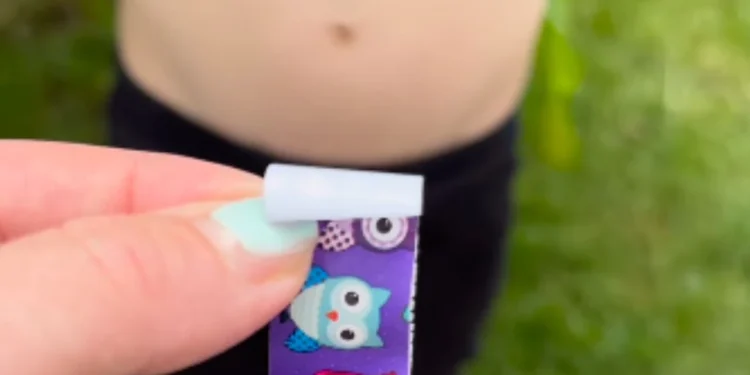Lagatar24 Desk
New Delhi: A viral video on social media has caught the attention of parents, claiming that sticking a band-aid over a child’s belly button can prevent motion sickness while traveling. Shared by Jasmin, the woman behind the popular clip, the video has garnered over 8 million views and sparked debate on whether this simple trick is effective or just another online myth.
The Viral Claim
In the video, Jasmin suggests that placing a band-aid over the navel can stop children from experiencing nausea while traveling. Though she admits she doesn’t know exactly how it works, she swears by its effectiveness, stating that it has helped her children and many others who messaged her to express their gratitude.
Some online users even compared this method to traditional Asian practices that involve covering a baby’s navel with cloth to prevent colic and gas. Others praised the hack, claiming it worked for them, while some chalked it up to the placebo effect—a phenomenon where people experience real improvements in symptoms simply because they believe a treatment will work, even if it has no active ingredients.
Experts Weigh In
While the internet might be buzzing about this band-aid hack, medical professionals are quick to debunk it. Dr. Poonam Sidana, Director of Neonatology and Pediatrics at CK Birla Hospital in Delhi, explained, “There is no scientific evidence supporting the effectiveness of the band-aid trick or similar methods like acupressure wristbands for motion sickness. These remedies, though popular, lack solid research or rigorous clinical trials.”
Motion sickness occurs due to a mismatch between what the eyes see and what the inner ear senses, causing dizziness and nausea. According to Dr. Shobha Subramanian Itolikar, a consultant at Fortis Hospital, Mumbai, “A band-aid on the belly button cannot address the sensory conflict responsible for motion sickness.” She adds that some online theories suggest the band-aid calms the vagus nerves, but there is no scientific backing for this claim.
The Power of Placebo
Many parents and even some medical experts suspect the placebo effect is at play here. Dr. Sam Hay, a health expert, told news.com.au, “Parents are being drawn into this placebo effect by influencers promoting unproven remedies.” He elaborated that while placing a band-aid on the belly button may seem to work for some, it’s likely due to belief rather than any actual physical effect.
Dr. Sidana also pointed out that the placebo effect can be powerful. “If someone believes a treatment will help, they may experience real symptom relief, even if the treatment has no therapeutic effect,” she said.
Is It Harmful?
Parents may wonder if trying this hack could harm their child. The consensus among experts is that while the band-aid trick may not offer real benefits, it’s also unlikely to cause harm. However, Dr. Sidana cautioned that younger children could experience skin irritation or allergic reactions to adhesive materials, and relying on such hacks could delay proper medical treatment for underlying conditions like vestibular disorders, which might be the real cause of chronic nausea.
Proven Methods for Motion Sickness
For those looking for scientifically backed remedies for motion sickness, experts recommend the following strategies:
- Medications: Some motion sickness medications can be effective but should only be used under medical supervision, especially for children.
- Positional Changes: Sitting in the front seat of a car or near the wings of an airplane helps minimize conflicting sensory inputs.
- Focus on a Stable Object: Looking at a distant, unmoving object can help reconcile sensory input and reduce nausea.
- Natural Remedies: Ginger and peppermint are known for their anti-nausea properties and can be consumed as candies or teas.
- Dietary Adjustments: Avoiding heavy meals before travel or providing small snacks can prevent nausea from developing.
Parents are encouraged to consult with healthcare providers to determine the best and safest option for their children.







